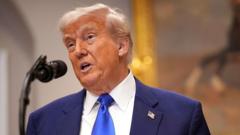The new tariffs imposed by the US have sent ripples through European economies, prompting leaders to strategize responses while preparing for the worst impacts on trade and industry.
**Europe Prepares for Trade Turbulence Amid Trump Tariff Shock**

**Europe Prepares for Trade Turbulence Amid Trump Tariff Shock**
Leaders across Europe are bracing for economic fallout following the announcement of new US tariffs. Negotiations and countermeasures are in the works as the stakes rise.
European Commission President Ursula von der Leyen has voiced concerns over the recent decision by the US to implement a 20% blanket tariff, calling it a "catastrophe for the economic world." The EU's leaders, initially anticipating some form of trade conflict, are now faced with a situation that could have severe implications for millions worldwide. In response, Europe is preparing to negotiate but also to retaliate if necessary.
EU Trade Commissioner Maros Sefcovic is set to meet with US representatives to discuss tariffs. He emphasizes the EU's intent to respond in a careful and unified manner, allowing ample time for discussion. National governments have scrambled to address the fears of illicit impacts on local industries, with Italian Prime Minister Giorgia Meloni convening emergency meetings to discuss the ramifications for the nation’s agricultural sector.
Countries most affected, like Italy and Spain, are feeling the brunt of potential economic setbacks. Italy's exports to the US could suffer significantly, particularly in agribusiness and wine, while Spain’s Prime Minister Pedro Sánchez has criticized the US for spreading misinformation about tariff rates.
Economically, Slovakia’s heavy industrial reliance makes it particularly vulnerable, forecasting a potential downturn in its economic output. The French sector, especially wine and spirits, anticipates substantial losses in sales due to the tariffs. In the face of uncertainty, businesses are bracing for impacts ranging from order freezes to potential market share losses as US consumers might turn to alternatives.
The mood in the European markets has been cautious, with many investors selling shares in companies that could be adversely affected. One small Sicilian business just beginning exports to the US finds itself directly impacted as they assess the situation alongside larger corporations facing similar pressures.
Across Europe, leaders are strategizing a collective response to counterbalance the US actions. The EU intends to roll out an initial series of tariffs in mid-April, retaliating against the US's previous tariffs on European steel and aluminum. These measures could target a broad spectrum of goods.
Germany’s acting Chancellor Olaf Scholz noted that the EU's strength lies in its large consumer market, stressing the importance of unity among member states. With potential countermeasures looming, including tariffs on US digital services, European officials are preparing for various scenarios as they navigate an increasingly challenging trade landscape.
Amidst this, the discourse around blame is rising, with some like Hungary's Foreign Minister pinpointing inefficiencies within the EU itself. Norwegians, though not EU members, also feel the heat of the tariffs, foreseeing significant impacts on their economy and exports.
Overall, the situation remains fluid, as both the US's and Europe's next moves are crucial in shaping the future of transatlantic trade relations.
EU Trade Commissioner Maros Sefcovic is set to meet with US representatives to discuss tariffs. He emphasizes the EU's intent to respond in a careful and unified manner, allowing ample time for discussion. National governments have scrambled to address the fears of illicit impacts on local industries, with Italian Prime Minister Giorgia Meloni convening emergency meetings to discuss the ramifications for the nation’s agricultural sector.
Countries most affected, like Italy and Spain, are feeling the brunt of potential economic setbacks. Italy's exports to the US could suffer significantly, particularly in agribusiness and wine, while Spain’s Prime Minister Pedro Sánchez has criticized the US for spreading misinformation about tariff rates.
Economically, Slovakia’s heavy industrial reliance makes it particularly vulnerable, forecasting a potential downturn in its economic output. The French sector, especially wine and spirits, anticipates substantial losses in sales due to the tariffs. In the face of uncertainty, businesses are bracing for impacts ranging from order freezes to potential market share losses as US consumers might turn to alternatives.
The mood in the European markets has been cautious, with many investors selling shares in companies that could be adversely affected. One small Sicilian business just beginning exports to the US finds itself directly impacted as they assess the situation alongside larger corporations facing similar pressures.
Across Europe, leaders are strategizing a collective response to counterbalance the US actions. The EU intends to roll out an initial series of tariffs in mid-April, retaliating against the US's previous tariffs on European steel and aluminum. These measures could target a broad spectrum of goods.
Germany’s acting Chancellor Olaf Scholz noted that the EU's strength lies in its large consumer market, stressing the importance of unity among member states. With potential countermeasures looming, including tariffs on US digital services, European officials are preparing for various scenarios as they navigate an increasingly challenging trade landscape.
Amidst this, the discourse around blame is rising, with some like Hungary's Foreign Minister pinpointing inefficiencies within the EU itself. Norwegians, though not EU members, also feel the heat of the tariffs, foreseeing significant impacts on their economy and exports.
Overall, the situation remains fluid, as both the US's and Europe's next moves are crucial in shaping the future of transatlantic trade relations.






















